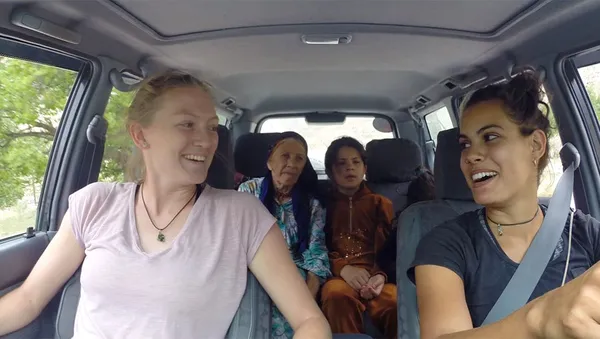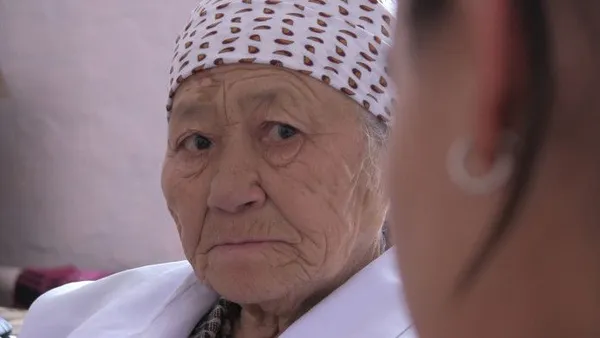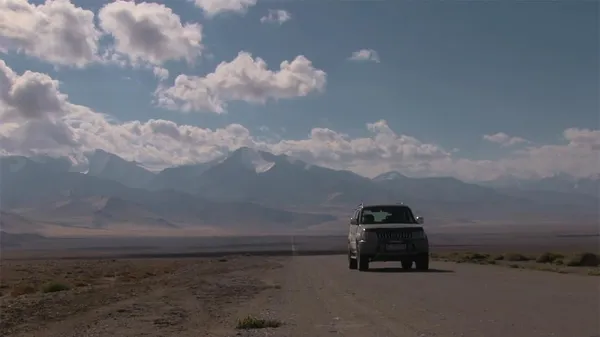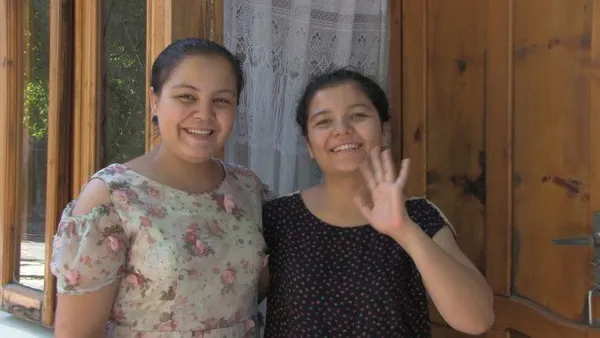 |
| Hannah, Cat and some hitchhikers. Cat Haigh: 'We genuinely did just pick up local hitchhikers, or someone would say, “Oh, you want to come and speak to my mum”, and it just snowballed from that' |
Hannah Congdon and Cat Haigh take a bright and breezy road trip with a feminist focus in their debut documentary Women Behind The Wheel. The pair of friends set off along 1900-mile Pamir Highway, which crosses Uzbekistan, Kyrgyzstan and Tajikistan, with the aim of chatting to as many women about their lives as they could along the way. What the film lacks in background geographical and historical detail it makes up for in energy and the open way that the two young women approach the trip and the interviews, which see them touch on everything from small businesses and child birth to taekwondo and the more serious topics of domestic abuse and bride kidnapping.
We caught up with them shortly after the film’s world premiere at Edinburgh International Film Festival to chat about the film and started by asking them about the genesis of the project.
Cat Haigh: Initially we had a period of time where we knew we wanted to travel somewhere. And we were really curious about these countries is that nobody's heard of, people can't even say them correctly, they're not really sure where they are. We started to do a bit more research and it's a very interesting part of the world, trapped between Russia and Afghanistan. And there's a lot of very interesting women's stories that have come about as a consequence of its ex-Soviet history, the growing role of Islam, trade, migration, the Pamir Highway that we started to delve into. Then we came across the Pamir Highway, which supposedly is the second highest road on Earth, that tracks through this region. We thought, ‘Oh, we wonder if any women have driven this road before solo?’ And from our research, it doesn't look like any have. And we decided, how can we marry up the idea of us as two women driving this route, but then use our journey to gain access to the local women living there and hear their stories and start to uncover some of these really interesting female stories that are going on at the region? It grew from there.
Amber Wilkinson: There must have been an awful lot of preparation before you started off, because presumably you can’t really do something like this on the hoof.
CH: It was honestly 50/50. Before we went we, we reached out to a lot of women on social media for probably a year from the initial concept of the idea and in terms of the concentrated element, probably three or four months before. So we received quite good reception from women out there saying, “Come”, and fixers, translators. We read loads of articles, and we'd get in touch with the journalists and see if they could point us in the right direction. So about 50% of the women that we wanted to speak to were mapped out in advance, but the other 50% we met by chance. We genuinely did just pick up local hitchhikers, or someone would say, “Oh, you want to come and speak to my mum”, and it just snowballed from that.
AW: Given it was just the two of you, I was thinking it must have been quite difficult form a shooting perspective, getting images of the car leaving places or arriving, for example.
Hannah Congdon: I think those things happened naturally along the way, the only things that you really had to think about was if you wanted an external car shot, and you had to jump out.
CH: Luckily, we had a bit of a foresight to think, Okay, we are going to need some filler shots. So there would be times when one of us would run half a mile down the road, and then the car would drive and then we reverse it back and we’d do those shots.
AW: What was your experience before you went, in terms of using the camera.
HC: Shooting stuff ourselves? Not very.
CH: You more so than me.
HC: I've done short films, but I hadn’t been doing their camera work. So we hadn't done loads.
CH: Before we had filmed a little mini promo for the film, which we'd done around the hills of Yorkshire - practicing the camera, practicing the driving and trying to get a feel for how we wanted to film it, but that was the extent of it.
HC: I think part of what I really like about the film is, we could go and make it now and we could shoot it far better or sort of slightly more slick way, but I think the kind of naivety of the camerawork and our attitude in it is part of the film.
AW: It definitely has a spontaneity you might have lost. Also I think even when you are prepared these things are always more knackering than you think they are going to be.
CH: 100%. You have this realisation, when you're driving think, “Oh, gosh, I really am actually driving this now”, having talked about it or planned it for so long. And the driving is tiring. But I think also it was very tiring was because of the emotional energy of really wanting to speak to as many women as we could, and trying to pack it in and trying to ask questions and moving from one topic to another topic. I think that was probably more tiring than driving.
HC: Trying to build a genuine relationship with people, when sometimes we don't have very much time, that does take quite a lot of energy.
AW: Was there anything you encountered that, even immediately, changed your perception of what you were doing? Or was it something that you were more able to process in hindsight
CH: For me, it was, in hindsight, looking back and really thinking was when we started to realise what ties these stories together, or the fact that these are all small individual acts of resistance that amount to something bigger. I think at the time, you come away from each interview, feeling something very specific to that interview. But I didn't necessarily have like a cohesive takeaway until reflecting on it when I came home.
HC: After Dilbar, who's the beekeeper, I think that was a bit of a realisation. It is sort of as radical to be in an extremely conservative, often quite remote society, and to make just incremental changes affect just a few women, as it is to host masturbation workshops in a big city [which one of the other women in the film has done. I was quite awestruck by lots of the women that we met, particularly in the Pamirs in these really miniscule towns who were doing quite extraordinary things.
 |
| Among those Cat and Hannah spoke to was gynaecologist Gulina, in Murghab. Kat Haigh: 'No two stories were the same. Every woman was different' |
It’s a different time of Islam in the Pamir region and there's sort of tropes, certainly in the West that people would be more conservative in the more religious areas, and that's just not the case. Religion is a means to education. A lot of stereotypes were upturned.
CH: No two stories were the same. Every woman was different. But then it was also about what is the overriding message that we really feel that we're taking away from all of these stories in all these interviews.
HC: It was ultimately a really diverse region. So it's quite hard.
CH: Yes, it's hard not to generalise, but also to give kind of an overall conclusion, but also you want to be as specific and nuanced as well. It was quite hard to think about how we tie it all together.
AW: Did either of you have any sort of language, Russian or anything going into this?
HC: The only language that came in useful was German. Germany have done loads of sort of soft power, a lot of investment for some reason, in a lot of NGOs they set up a lot of religious organizations that were German run. I speak German, so really weirdly, in a homestay in the middle of the Wakhan Corridor, I spoke German.
CH: We but we knew that language was going to be an issue so in areas where we knew there would be quite a few women that we wanted to speak to, we'd arrange for local translators to hop in the car with us and come with us for a few days, and they helped out. And then in the towns and villages where we really did just rock up by ourselves there was always someone who could speak a bit of English, and somebody would go fetch them when they'd come down from wherever they were, and they would step in and help.
But a lot of the interviews were understood more when we came back, and we got the transcripts written, because a lot of our translators were not phenomenal. They were giving us the gist of what they were saying, but they weren't translating it word for word. So when people in London helped us do transcripts, and we read it through, we said, “Oh, my gosh, they actually said all of this detail”, and that was amazing.
AW: Were you ever concerned about safety.
CH: In retrospect, we weren't overly concerned, maybe we should have been more concerned. The countries that have “stan” at the end do get bandied around as being a little bit more off limits, especially for like female travellers. Where are we concerned? In reality, we genuinely did not feel threatened.
AW: It seems like you had quite a quite a positive experience broadly with the men that you did encounter.
HC: There are a lot of looks and a lot of comments and things but not threatening.
CH: It was generally very non-threatening, it was more genuine gobsmacked curiosity at what we were doing behind the wheel. And we got pulled over by the police a fair few times. And one of the things that I'd been told beforehand was actually be careful of that because the police are the ones that are probably the most corrupt. In Tajikistan, it basically tracks the border of Afghanistan for a long time. So it's a heavy military practice. But the police were lovely to us. I mean, we got pulled over for some speeding fines, and they let us go. And they gave us directions. They were actually very warm and helpful. So safety for us wasn't a huge concern.
HC: It is worth saying that over the last year in that Pamir region - it’s an autonomous region of Tajikistan – and I think there are tensions bubbling. Tensions between the sort of centralised government and the Pamir region which has quite a different branch of Islam. Then a couple of protesters were killed in May in the city where we went to the festival.
CH: We've received messages from some people from Tajikistan who know us and had watched bits of the film and they said, you know, that region you went to where you came to that amazing festival of culture, 20 people have been killed there in the past three weeks. I wouldn't say that they're on a trajectory where women's rights, for example, are getting better and better. I think it's a very bumpy journey that they're on.
AW: You said there were a lot more people than you could, inevitably, including in the film. How did you set about deciding who to include?
HC: We spoke to so many people and we found it really hard. And there were people that I wanted to include, like, there was an LGBT activist who really wanted to be in the film.
CH: There was a lady who volunteered like an orphanage with disabled children and we wanted her to be in. We ultimately had to be quite ruthless, thinking about what are some of the key things that we want to bring out? Key themes, but then also, how do we portray enough diversity without it being too disparate as well.
HC: You are never going to make something that is was entirely representative because they’re diverse countries. The structure that was quite difficult. Because with a road trip, we have to put things chronologically, it’s quite hard to move things around because otherwise you lose the geographical specificity of it.
AW: I think the young perspective is nice, compared to a lot of older men we often see doing these sorts of films. There’s always something specific about the age you are when you do something. I'm sure you even feel differently about it now than when you were doing it.
HC: I watch the camerawork and think if I did that now, it would look so different. But we'd also not be able to make that film again. I think there's a lack of self-consciousness, that is part of it.
CH: And there's a real authenticity because we really weren't pretending to be anything that we weren’t.
AW: I felt that was on your side, because I think people can sense if you have an agenda. You had a broadly feminist thought in your head.
HC: I think what you said about sort of the kind of tradition of a road trip or travelog that is often suggesting it is speaking with authority in a country that they don't know anything about. And I think what we really wanted to do was try to just slightly shift that way of presenting,
CH: To shift the microphone to the women themselves as much as we could and give them a platform to tell their stories.
HC: But also not to try to pretend. There was so much that we didn't know, we didn't speak the language, we got things wrong and we wanted to include those bits in the film and not you know, not have some kind of voice of God.
Women Behind The Wheel is screening at EIFF tonight (August 18) at 6pm at Vue Omni 10 with the filmmakers in attendance. You can read more about the film and Hannah and Cat's journey on their Facebook page and Instagram























